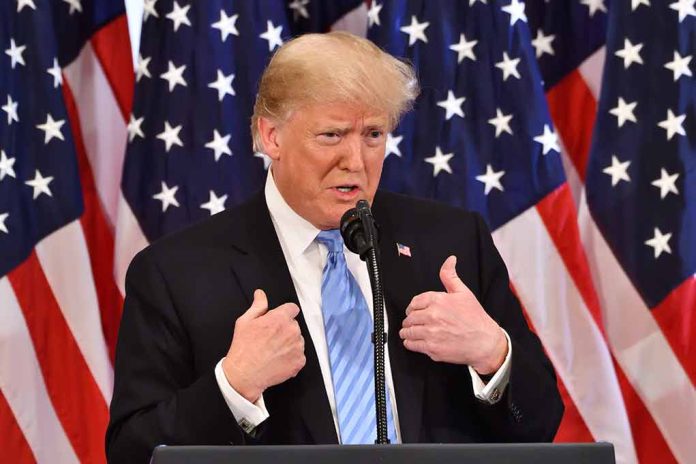
(UnitedVoice.com) – On February 16, New York Supreme Court Justice Arthur Engoron issued a searing decision and order in New York v. Trump (NYSCEF Doc. No. 1688), the former president’s civil fraud trial. That 92-page document ordered Donald Trump to pay a $355 million penalty plus an additional $98.6 million in interest. On March 18, Trump’s lawyers filed a reply memorandum of law seeking a stay pending appeal to avoid having to post a roughly $453.6 million bond by March 25. Recent news reports indicated that an extremely unlikely source could save Trump.
Over the last few weeks, several conservative websites started reporting on a landmark Supreme Court ruling handed down in 2019. The late Justice Ruth Bader Ginsburg wrote the majority opinion for the court in Timbs v. Indiana (139 S. Ct. 682), holding that the Eighth Amendment’s protection against the imposition of “excessive fines” applied to the states under the 14th Amendment‘s Due Process Clause.
Some conservative legal experts, pundits, and websites have theorized that Trump’s legal team could use that ruling during his appeal before the New York Supreme Court’s appellate division to obtain a significant reduction in the amount of money he has to pay to dispose of his New York civil judgment.
However, there’s a potential glitch in that strategy. The Supreme Court has consistently held that the Eighth Amendment‘s Excessive Fines clause only applies to criminal fines and civil forfeitures. Unfortunately, Judge Engoron’s order imposed a disgorgement against Trump, not forfeiture. The distinction may appear semantic but isn’t within the nation’s courts.
The Supreme Court handed down a decision in 2020 discussing the distinction between disgorgement and civil forfeiture. Liu v. Securities Exchange Commission (140 S. Ct. 1936, 207 L. Ed. 2d 401) definitively held that disgorgements are equitable relief and not a form of forfeiture.
Liu v. SEC explained that disgorgement included the direct proceeds/profits obtained by a party from wrongdoings. However, a forfeiture can consist of the secondary profits received from a legally infirm action and any ill-gotten gains.
Considering SCOTUS’ ruling in Timbs v. Indiana and Liu together, it appears unlikely that Trump could obtain a reduction based on the Eighth Amendment. However, experts on both sides of the political spectrum say he could still receive an order reducing the total amount of his disgorgement. Time will tell.
Copyright 2024, UnitedVoice.com






















